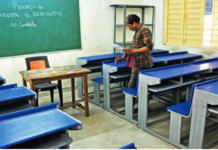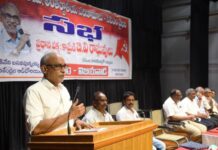Amaravathi, August 02, 2021: The intermediate education in Andhra Pradesh is going to transform from the 2021-2022 academic year as several aspects known to the public for decades will cease to exist, leading to opening up of a new chapter of higher secondary education in the state.
Strictly online admissions, fixed fees and Scheduled Castes, Scheduled Tribes, Other Backward Classes (OBC) and women’s reservations in admissions in all the junior colleges will usher in unprecedented changes among others.
Board of Intermediate Education (BIE) secretary V. Ramakrishna said all these illegal offline admissions have no official sanction and will not be recognized.
“They don’t have any sanctity or sanction from the board. We give a login and only through this details of students can be entered and that will be treated as proper admissions to get the hall-ticket for the BIE intermediate examination,” Ramakrishna told IANS.
All other illegal offline admissions will not be recognized by the BIE. This assumes significance as some popular junior colleges have already illegally admitted hundreds of students without even the BIE issuing the notification for admissions.
“Junior colleges merely entering the names of students in their registers will not become legitimate BIE intermediate admissions. They are informally taking admission like booking a slot,” the secretary pointed out.
Further, he noted that it will not be easy for the board to trace the offline admissions as the colleges can easily manipulate. Ease of seeking admission in a college of student’s choice, abolishing the illegal custody of certificates with college managements, and data integrity are the goals of online admissions.
The BIE has also removed the need to physically verify a student’s Class 10 certificate and other documents, a much-abused procedure to gain complete domination over students.
With this move, the Andhra Pradesh government aims to clip the wings of many corporate junior colleges which have a notorious record of harassing students by keeping their certificates with them.
The online procedure enables a student to join a college without the need for a student to produce any physical certificates or even e-certificate to college managements.
Aiming at wiping out decades-long widespread abuse and indiscriminate commercialisation of intermediate education in the southern state, the board introduced only online admissions from this academic year.
In addition to these illegal admissions, the corporate colleges are also demanding students to pay more fees during the online classes which they are conducting now but the board has other plans.
Considering the profiteering nature of these entities, BIE is working on capping fees for the intermediate course, depending on the nature of admission such as day scholar, boarding, intermediate tuition and competitive examination coaching and others according to the reports published in timesofindia.indiatimes.com.
“Now the fee finalization process is almost over. It is going to be announced soon. Then there will be clarity,” he noted.
Following this procedure, the board will clearly define the fee structure for day scholar admission, hostel admissions, transport and coaching cost, which cannot be violated at any cost.
The fee structure will be uniform across the state, which will be fixed by the Andhra Pradesh School Education Regulatory Monitoring Commission (APSERMC).
APSERMC has the authority to fix the fee structure for tuition as well as coaching.
Now the fee part will be clarified as the colleges will be required to give clear-cut bills outlining the tuition fee, coaching fee and others, unlike the earlier practice of creating ambiguity and taking the gullible teachers and students for a ride.
“Now you can demand the colleges to write in the invoice what is the cost of coaching? Coaching means how much? For intermediate how much? That is fixed. That clarity will come. We are not preventing them from offering coaching. Only thing is they are merging both tuition and coaching and collecting the fee,” he said.
Ramakrishna, a senior Indian Revenue Service (IRS) officer, highlighted that the private intermediate education lobby and corporate colleges cartel are always on toes to thwart any long overdue reform being initiated.
Though it is illegal to merge intermediate courses with competitive examinations coaching classes for tests such as Engineering, Agricultural and Medical Common Entrance Test (EAMCET) or the Indian Institute of Technology (IIT), the status quo is continuing for the time being.
EAMCET coaching classes are categorised as tutorial classes as per Section 32 of the Education Act and entities interested to foray into this segment must procure a separate permission from the government and should have their own facilities, delinked from intermediate colleges.
BIE is keen on cracking the whip on these illegal practices and has already forwarded the file to the government to separate intermediate classes and coaching classes, which is yet to come.
For implementing reservations, Ramakrishna said the board will issue a circular, clearly detailing all the rules and directions to be followed.
“In the first week of August, the board is planning to conduct a meeting with the stakeholders of intermediate education. We will take the opinion of the stakeholders, compile our directions and issue the circular,” said the secretary on online admissions process.
Based on the health department’s directions, physical classes are expected to start from the middle of August.
He said admission notification for first year students is delayed because the actual results for SSC students are yet to be announced, though all have been passed.
According to Ramakrishna, 2021-22 academic year will be radically different from the past, considering the reforms ushered in the forms of online admission, reservations and fee structure while it will take some time to implement the 1:40 teacher student ratio.
All branches of education, from kindergarten to college and university in the southern state have a strong presence of profiteering corporate players, who minted money over the decades, taking gullible students and parents for a ride with their make believe promises.
Ramakrishna says he is on a mission to sanitise intermediate education which has been abused for decades and condoned by successive governments and officials.




















